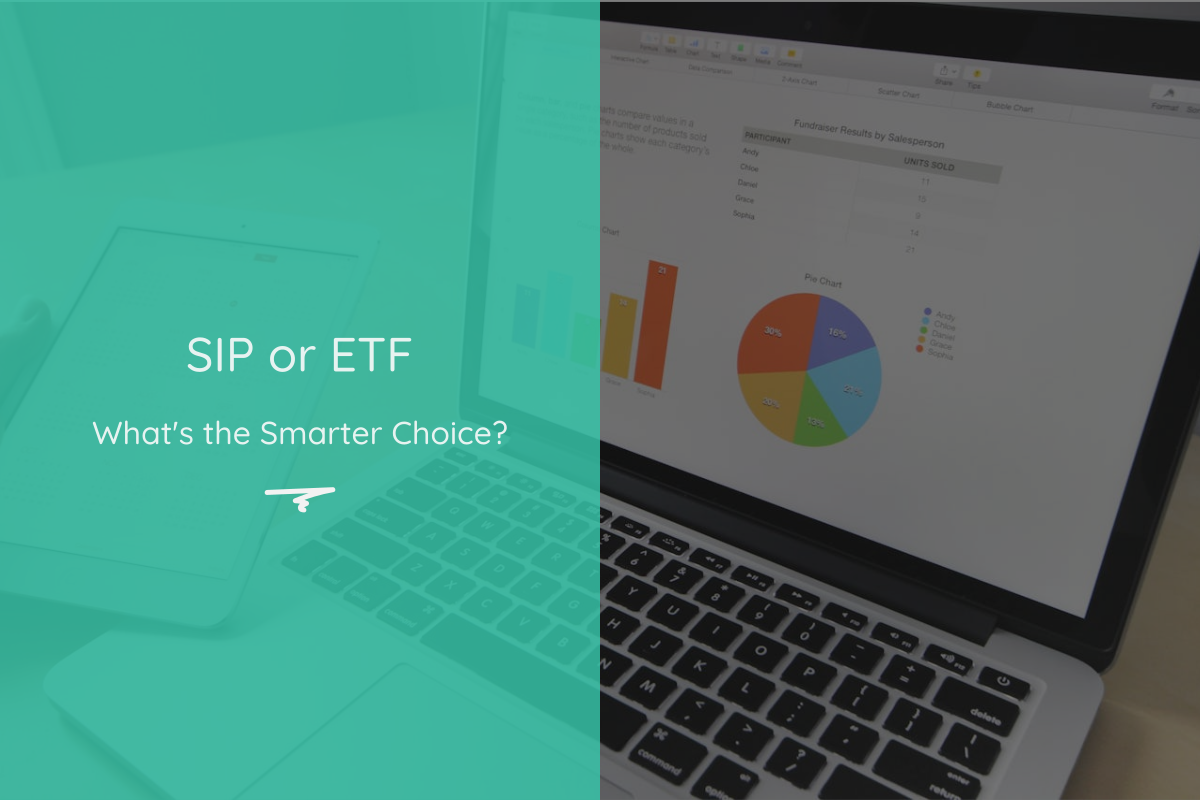When it comes to investing, there are many options available for Indian investors. Among the most popular are Systematic Investment Plans (SIPs) and Exchange-Traded Funds (ETFs). While both have their unique advantages, the question remains: which one offers better returns?
In this blog post, we’ll dive into the differences between SIPs and ETFs, their benefits, and which might be better suited for you depending on your financial goals.
What is a SIP?
A Systematic Investment Plan (SIP) is a method of investing in mutual funds where you invest a fixed amount of money at regular intervals—typically monthly. SIPs allow you to buy units of a mutual fund regardless of the market conditions, which helps in averaging out the purchase cost over time, a concept known as Rupee Cost Averaging. This method makes investing more affordable for everyone, as you don’t need to put in a large sum of money upfront.
Benefits of SIPs
Affordable for Beginners: You can start investing with as little as ₹500 per month.
Disciplined Investing: SIPs encourage regular savings, making investing a habit.
Rupee Cost Averaging: By investing regularly, you spread out your investments over market ups and downs, reducing the risk of timing the market.
Compounding Effect: Over time, your returns start generating additional earnings, leading to wealth creation.
Long-term Focus: SIPs are great for achieving long-term goals like retirement, buying a house, or children’s education.
Stay Ahead: Top Emerging Sectors in the Future Stock Market
ETFs vs. Stocks: Why ETFs Are the Smarter Investment in Market
What is an ETF?
An Exchange-Traded Fund (ETF) is a type of investment fund that is traded on the stock exchange, similar to stocks. ETFs typically track a market index like the Nifty 50 or Sensex. By investing in an ETF, you essentially own a basket of stocks that represent the index. ETFs are known for their low cost and flexibility, as they allow you to trade anytime during market hours.

Benefits of ETFs
Lower Expense Ratio: ETFs generally have lower fees compared to mutual funds because they are passively managed.
Flexibility: Since they are traded like stocks, you can buy or sell ETFs anytime during market hours, providing more liquidity.
Diversification: ETFs give you exposure to a broad range of stocks with a single investment, reducing the risk of investing in individual stocks.
Transparency: The holdings of ETFs are published daily, so you know exactly what you’re investing in.
Market Participation: ETFs allow you to participate directly in the stock market, which may offer higher returns over time compared to mutual funds.
Comparing Returns: SIP vs ETF
Now that you understand the basics of SIPs and ETFs, let’s tackle the big question – which one offers better returns?
SIP Returns
The returns from a SIP depend on the performance of the underlying mutual fund. Typically, equity mutual funds invested via SIPs have delivered annualized returns between 10-15% over the long term. The actual returns can vary depending on factors like market conditions and the performance of the fund manager. However, due to Rupee Cost Averaging, SIPs tend to perform well during volatile markets, as you accumulate more units when prices are low.
ETF Returns
ETFs typically offer returns that mirror the performance of the index they track. For instance, if you invest in an ETF that tracks the Nifty 50, your returns will reflect the performance of the Nifty 50 index. Over the long term, indices like the Nifty 50 have historically delivered average returns of 12-14% annually. Since ETFs have lower management fees, they may offer slightly better returns compared to actively managed mutual funds, especially over longer periods.
Factors to Consider Before Choosing
Risk Tolerance
- SIP: Ideal for risk-averse investors who prefer steady and consistent investments.
- ETF: Suitable for those who can tolerate market volatility, as ETF returns depend directly on the market’s performance.
Investment Horizon
- SIP: Best for long-term goals, typically over 5-10 years or more. The power of compounding works best when you invest regularly for the long term.
- ETF: Can be used for both short-term and long-term investments. However, long-term investors benefit the most from the low-cost structure of ETFs.
Cost
- SIP: Mutual funds charge an expense ratio, which can range from 1-2% for actively managed equity funds. These fees may eat into your returns over time.
- ETF: ETFs have lower fees, usually less than 1%. This low cost makes ETFs a better option for cost-conscious investors.
Market Knowledge
- SIP: Since mutual funds are managed by professionals, SIP investors don’t need to actively monitor the market.
- ETF: ETF investors should have a basic understanding of how the stock market works, as they are directly exposed to the market’s ups and downs.

Tax Implications
Both SIPs and ETFs are subject to capital gains tax, but the rates differ slightly.
- SIP: Equity mutual funds held for over a year are subject to long-term capital gains tax (LTCG) at 12.5% if your gains exceed ₹1 lakh in a financial year. Short-term gains are taxed at 20%.
- ETF: ETFs tracking equity indices are taxed similarly to equity mutual funds. However, if you invest in debt ETFs, they are subject to a long-term capital gains tax of 12.5% with indexation benefits if held for over three years.
Which is Better for You?
The answer depends on your financial goals, risk tolerance, and level of market knowledge.
- Choose SIP if you are a beginner, prefer consistent and disciplined investing, and want to avoid the hassle of timing the market. SIPs are also ideal for those with long-term financial goals, such as retirement or children’s education.
- Choose ETF if you have a bit more experience with the stock market, prefer lower fees, and are looking for a flexible investment option that can be traded like stocks. ETFs are great for those who want to track the market closely and are comfortable with volatility.
Conclusion
Both SIPs and ETFs have their pros and cons, but neither is inherently better than the other. SIPs offer a structured, disciplined approach to investing, while ETFs provide flexibility, lower costs, and market-based returns. Ultimately, the best choice depends on your personal financial situation, investment goals, and risk appetite.
If you are looking for long-term wealth creation without the hassle of actively managing your investments, SIPs could be the better option. On the other hand, if you’re market-savvy and prefer lower costs, ETFs might be more appealing to you.
Remember, the key to successful investing is consistency and a clear strategy—whether you choose SIP or ETF, staying committed to your investment plan is what will yield the best results in the long run.

Leave a Reply